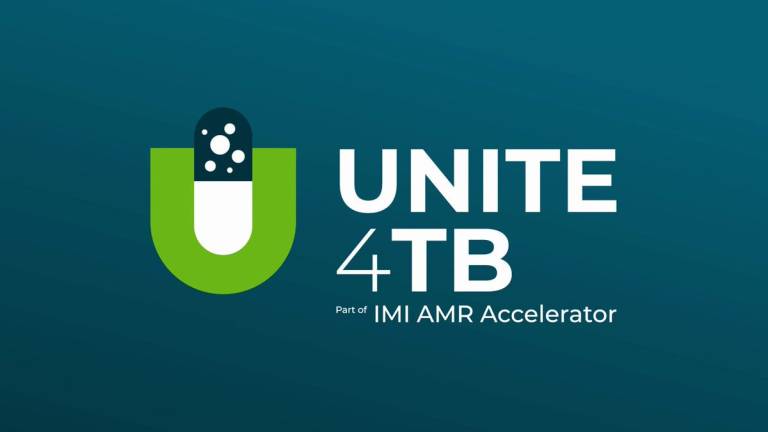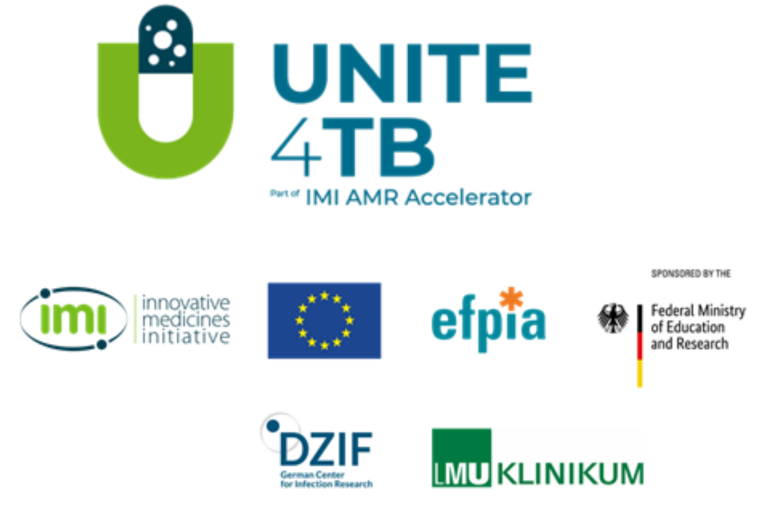PARADIGM4TB starts recruiting
24 January 2024
The PARADIGM-TB trial - the first product of the UNITE4TB consortium - has started recruiting patients

The PARADIGM4TB trial, a new phase 2B/C platform trial aiming to accelerate the development of new tuberculosis (TB) regimens, has recruited its first patient. PARADIGM4TB is sponsored by the MRC Clinical Trials Unit at UCL, and is part of UNITE4TB, the largest collaboration between academic partners and pharmaceutical companies which strives to fast-track the development of tuberculosis drugs.
The PARADIGM4TB trial is part of the programme of trials launched by UNITE4TB in November 2023. The trial has now enrolled its first participant at the University of Cape Town Lung Institute. This is a major milestone for the project and the TB community as a whole, helping to advance TB science and deliver new treatments more efficiently.
TB is a major threat to public health and is among the leading causes of death worldwide according to the World Health Organization. In 2022, TB claimed the lives of 1.3 million people, making it the second most deadly infectious disease after COVID-19. The emergence of drug-resistant TB and current standard of long treatment regimens have increased the urgency for action and investment in TB research.
For people affected by TB, the most important outcome is rapid access to better regimens of a shorter duration and with fewer side effects. UNITE4TB is engaging with key societal stakeholders to ensure that its novel regimens will be made available as efficiently as possible.
UNITE4TB’s innovative programme of trials will test 14 different combinations of nine existing drugs, as well as two newly developed candidates (GSK6561 and BTZ-0432). The ultimate aim is to create regimens that can further improve treatment for multidrug-resistant TB, and also effectively treat drug-sensitive TB. Apart from PARADIGM4TB, the UNITE4TB clinical trial program includes DECISION, a BTZ-043 dose evaluation in combination study.
PARADIGM4TB will test multiple regimens and durations of treatment in pulmonary TB. The trial will establish which fourth drug (either moxifloxacin, linezolid, or pyrazinamide) should be added to a bedaquiline, delamanid/pretomanid, BTZ-043 or GSK656 regimen. It will also explore the effectiveness of a totally new combination of GSK656 and BTZ-043 together with bedaquiline and delamanid/pretomanid.
The trial will run across 30 trial sites on four continents (Europe, Asia, Africa and South America). The MRC CTU at UCL is leading on the design, conduct, oversight of safety and statistical analysis of PARADIGM4TB, bringing a wealth of expertise in the development of innovative clinical trials to the project.
PARADIGM4TB will have two main stages. Phase 2B will assess the safety of each drug combination given for 16 weeks and how quickly they decrease the number of living TB bacteria in the sputum. Researchers will choose the most promising drug combination to progress to phase 2C, which aims to find the optimal length of treatment (between 8 and 16 weeks) to be used in separate, large-scale phase 3 trials.
Hanif Esmail, Clinical Associate Professor in Infectious Diseases at the MRC CTU at UCL and UCL Institute for Global Health, said:
“The MRC CTU at UCL is proud to lead PARADIGM4TB as part of the UNITE4TB trial programme, using a new, more efficient design to address multiple questions in one seamless clinical trial and deliver faster results for TB patients. Building on the Unit’s history of world-leading research, which has previously influenced global TB treatment guidelines multiple times, PARADIGM4TB has the potential to identify an entirely new regimen that will make treatment shorter and more manageable for patients with all types of TB.”
This project has received funding from the Innovative Medicines Initiative 2 Joint Undertaking (JU) under grant agreement No 101007873. The JU receives support from the European Union’s Horizon 2020 research and innovation programme and EFPIA, Deutsches Zentrum für Infektionsforschung e. V. (DZIF), and Ludwig-Maximilians-Universität München (LMU). EFPIA/AP contribute to 50% of funding, whereas the contribution of DZIF and the LMU University Hospital Munich has been granted by the German Federal Ministry of Education and Research.
About the UNITE4TB clinical trial phase 2B/C program:
The UNITE4TB clinical trial program is made up of the DECISION and PARADIGM4TB trials. The trial sponsor for DECISION is LMU University Hospital Munich. For PARADIGM4TB, the trial sponsor is the MRC CTU at UCL.
DECISION (BTZ-043 Dose Evaluation in CombInation and SelectION) is a phase 2B, dose-finding study, comparing the safety and efficacy of different doses of BTZ-043 administered with a backbone of bedaquiline and delamanid, in participants with drug-sensitive tuberculosis. Participants will be assigned to receive either one of three BTZ-043-containing regimens or a comparator regimen of bedaquiline, delamanid and moxifloxacin. The objective is to find the optimal dose of BTZ-043 to be used in subsequent studies.
PARADIGM4TB is an innovative seamless phase 2B/C platform trial that will be active in approximately 30 trial sites on four continents (Europe, Asia, Africa and South America), with the goal of delivering novel phase 2B/C clinical trials that will accelerate the development of new TB drugs and regimens with a higher probability of success in subsequent phase 3 clinical trials.
Disclaimer: This communication reflects the author's view. Neither IHI nor the European Union, EFPIA, or any Associated Partners are responsible for any use that may be made of the information contained herein.
Further information:
1. GSK656 is a 3-aminomethyl 4-halogen benzoxaboroles, a new class of antibiotics that inhibit leucyl-tRNA synthetase (LeuRS), an essential enzyme for mycobacterial protein synthesis.
2. BTZ-043 is a benzothiazinone, a new class of anti-tuberculosis compounds that inhibit Mycobacterium tuberculosis cell wall synthesis by blocking the decaprenyl- phosphoribose-2′-epimerase (DprE1), necessary for the arabinan biosynthesis.

 Close
Close

